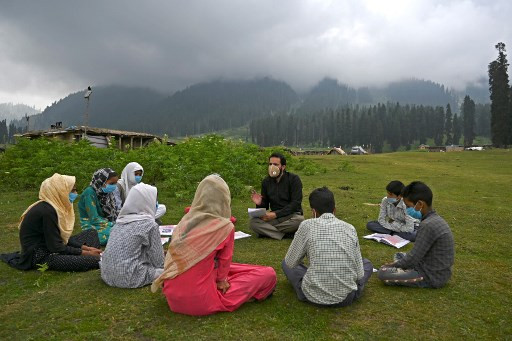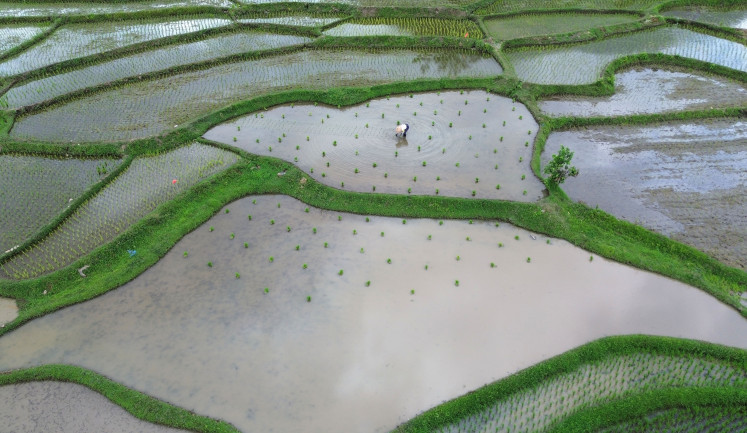Popular Reads
Top Results
Can't find what you're looking for?
View all search resultsPopular Reads
Top Results
Can't find what you're looking for?
View all search resultsThe rising stars of the valley: Women in Kashmir
While there has been a steady increase in women’s cellphone ownership across the country since 2015, it is, indeed, heartening to know that almost three fourths of Kashmiri women own a device that helps them stay connected to the rest of the world.
Change text size
Gift Premium Articles
to Anyone
 Students attend a class at their open-air school situated on top of a mountain in Doodhpathri, Indian-administered Kashmir, on July 27, 2020. - Schooling in restive Kashmir has been severely disrupted by the pandemic, but also after a strict curfew was imposed almost a year ago when New Delhi stripped the Muslim-majority region of 14 million people of its semi-autonomy. (AFP/Tauseef Mustafa )
Students attend a class at their open-air school situated on top of a mountain in Doodhpathri, Indian-administered Kashmir, on July 27, 2020. - Schooling in restive Kashmir has been severely disrupted by the pandemic, but also after a strict curfew was imposed almost a year ago when New Delhi stripped the Muslim-majority region of 14 million people of its semi-autonomy. (AFP/Tauseef Mustafa )
F
or reasons known to us, the valley of Kashmir has been a flashpoint for crises for long. However, the time has now come to change the narrative, especially as the newly-carved Union Territory has come to fare quite well in the sphere of women’s development.
It becomes particularly important to highlight these feats not only because it brings out the best that this otherwise volatile region has to offer. But, also because these stories of human growth and development help in challenging myopic opinions that picture and portray the beautiful valley of Kashmir as a space of intractable political and security conflicts.
To counter such under-informed, and perhaps even misinformed, views on Kashmir, what better way is there to start a positive discussion on social development in the valley than to turn our attention to its telecom sector? You will be amazed to know that in terms of cellphone ownership, the women of Kashmir leave behind their counterparts in the capital of the country by a good margin.
According to Stats of India, more than 75 percent of women in Kashmir own mobile phones, which is the 12th highest ratio in the country. While there has been a steady increase in women’s cellphone ownership across the country since 2015, it is, indeed, heartening to know that almost three fourths of Kashmiri women own a device that helps them stay connected to the rest of the world.
In another first for the women of Kashmir, the University of Kashmir has heralded the dawn of female empowerment on the academic landscape of the Valley. After more than 70 years since its inception, the university was given its first woman vice-chancellor, Nilofer Khan. A well-known academic and university administrator, she currently heads the university from its main campus in Srinagar.
Stressing on the role of innovations, incubation and skill development in empowering the youth of the union territory of Jammu and Kashmir, Khan has vowed to make full use of the New Education Policy - 2020 (NEP) to establish institutional tie-ups with other Indian as well as international universities of eminence.
The University of Kashmir was recently accredited by the National Assessment and Accreditation Council (NAAC) of India with an A+ grade, testifying to the quality academic spirit that has taken hold of the Valley. Gender studies is another core area that the newly appointed vice-chancellor hopes to develop at the University of Kashmir during her tenure.
From one woman achiever to another, entrepreneurialism also appears to have carved out many success stories in the valley. One of them is Srinagar’s Rifat Jan. Running and managing the only female run manufacturing enterprise in the union territory, Jan’s journey as a successful businesswoman is one of grit and determination.
A sport that largely remains a male-dominated domain, the phenomenal rise of Rifat, and no less than as a maker of the beloved cricket bats, had to deal with initial phases of reluctance and financial difficulties. But not only did her perseverance help her overcome the odds, it was also the biggest factor behind the continuing expansion of her business.
Currently, Jan runs bat-manufacturing units in Awantipore, Anantnag and Pampore, besides Srinagar. Her business has takers in cities all over India, particularly Mumbai and Chennai where the cricket bats from Kashmir appear to be most in demand.
If the successful businesswoman from Srinagar has been leading the mantle of medium-scale entrepreneuralism in the valley, the women of Doodhpathri, a famous tourist town in Kashmir, have transformed their cooking skills into a sustainable business collective.
Challenging the underrepresentation of women in the tourism industry in the valley, a micro-initiative run by the women of this small town is particularly critical for the region where the female labor force participation ratio is one of the lowest in the world.
What more? These housewives-turned entrepreneurs are ensuring that their businesses are environmentally sustainable. Their makeshift stalls are near-zero waste. From selling freshly-made food in reusable plates to not selling packaged food to prevent polyethene waste, the women entrepreneurs of Doodhpathri source most of the raw material from their own farms, while whatever eco-waste they generate is converted into manure for their fields.
And how can we forget the tales of inspiration that come from the rural belt of the union territory? Gund, a small village in the Kangan area of Kashmir’s Ganderbal district, has become an experimental ground for a collaboration between the Indian army and the women of this hamlet.
Three months ago, under the guidance of India’s armed forces, a group of 20 women came together to start a self-help group called Sonmarg Foods. Making pickles and jams from fresh farm produce, this self-help group has dispatched more than 500 bottles of its handmade delicacies to different parts of the country. Interestingly, the marketing of Sonmarg thy name is Kashmir woman.
***
The writer is a President Graduate fellow and PhD candidate at the Department of Geography, National University of Singapore.










